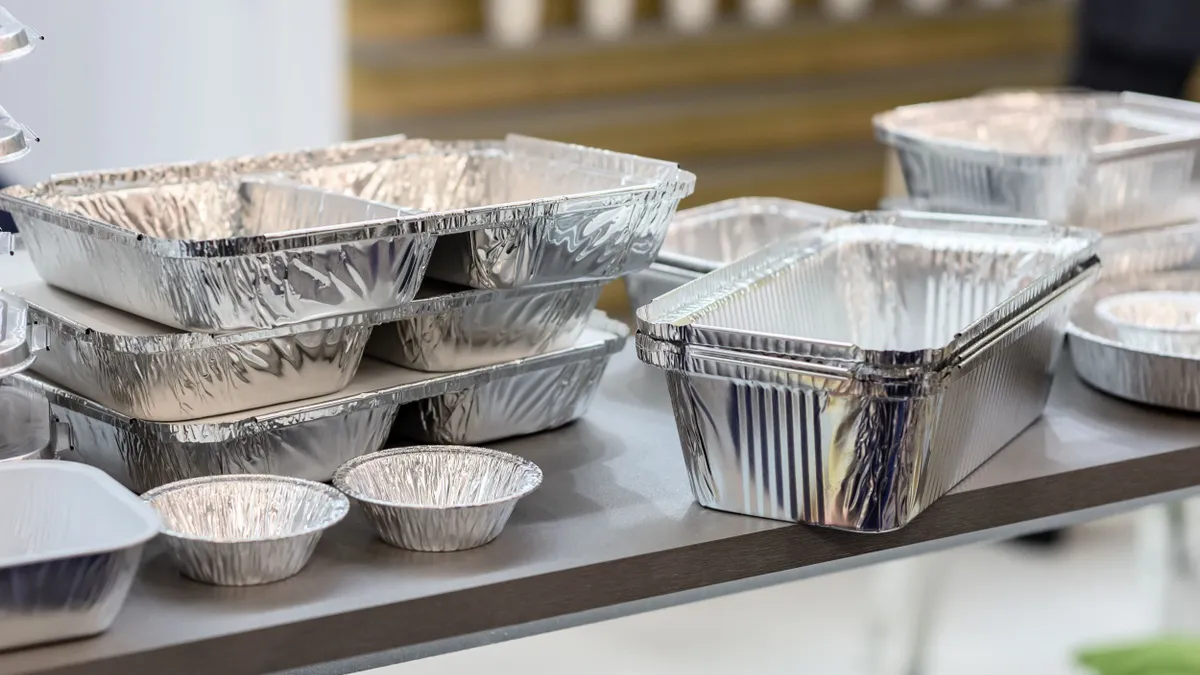Metal packaging manufacturers today are assessing the impact of tariffs on steel and aluminum imports that President Donald Trump announced Monday evening. They’re raising red flags about inadequate U.S. metal production capacity and anticipated higher costs for both the packaging industry and consumers.
Trump signed executive orders restoring the 25% steel tariff rate he implemented in 2018 under Section 232, and upping the previously enacted 10% rate on aluminum to 25%. The White House says the U.S. steel and aluminum industries have been “harmed by unfair trade practices and global excess capacity.”
The new tariffs do not provide exemptions, and they eliminate exemptions that had been in place for some previous tariffs, including those that former President Joe Biden imposed on steel and aluminum last year. The new tariff levels will go into effect and current exemptions will expire March 12, according to the White House.
The United States imports about a quarter of its steel, according to U.S. Census Bureau data cited by Reuters. Most of it comes from Canada, followed by Brazil and Mexico. For aluminum, about half of what is used in the U.S. is imported, the overwhelming majority coming from Canada.
Impacts to the packaging industry
U.S.-based steelmakers generally favor the new tariffs, indicating they have struggled to compete in a market with cheaper imports. But the tariffs aren't universally applauded: Many industries that manufacture products from steel and aluminum, such as food and beverage cans, have flagged that tariffs bump up their costs.
“The new tariffs are going to increase the cost of tin plate steel used to make food cans,” said Can Manufacturers Institute President Robert Budway in an interview Tuesday. “Those costs get passed on to the food producers, who pass it on to the retailers, who pass it on to the consumer. So consumer prices will go up, and the tariffs are inflationary for us.”
Prior to the new tariffs, Amcor executives broadly said on their Feb. 4 earnings call that if tariffs impacted their costs, the company could pass down the burden to customers. Other executives, including at Ball and Crown, expressed concern last week about the impact of these costs ultimately trickling down to stressed consumers.
Following the emergence of Trump’s initial tariffs last week on goods from Canada, Mexico and China, and retaliatory tariffs from those countries, CMI joined others in calling on Trump to provide targeted relief. The group said that overly broad measures negatively affect U.S. canned food industry participants, as well as American consumers, and put the nation's food safety at risk.
“Tariffs and other broad trade tools can make America great again, but there are unintended consequences for our nation’s food security when a tariff is placed on tinplate steel,” CMI’s Budway said in a Feb. 5 statement.
“Domestic production of tin mill steel used to make cans for fruits, vegetables, and other essential foods Americans consume daily declined dramatically over the last seven years. 70% of the tin mill steel needed to make canned products is imported today. President Trump should support American farmers, food producers, and consumers by removing all tariffs on tin mill steel,” Budway added.
Charles Johnson, president and CEO at the Aluminum Association, said in a statement Tuesday that while the group recognizes Trump’s focus on trade actions to support U.S. industry, and more than $10 billion in domestic aluminum industry investments since 2016, the American aluminum industry needs “ready and affordable access to metal” for those investments to be successful. “Today, there is not enough smelting capacity in the United States to supply the growing aluminum industry with the input materials it needs,” Johnson said.
AA is calling on Trump to secure necessary aluminum access while still taking actions against “unfairly traded aluminum” from China and elsewhere. “This is consistent with action his administration wisely took during his first term and we are confident he will take again,” Johnson said.
Ahead of the tariffs announcement, CMI joined CPGs and packaging manufacturers such as Silgan and Sonoco in sending a letter to Trump asking for industry safeguards from tariffs. CMI released a related statement noting that the Section 232 tariffs during Trump’s first term ended up having contrary effects to what they were intended to do. It says that U.S.-based tin mill steel producers shut down nine tin mill lines. Only three lines remain open in the U.S. today, comprising 1% of domestic steel production, CMI says.
Plus, as consumers — especially those who use food assistance programs like SNAP — face tariff-driven higher prices on U.S. goods, they might seek value by opting for cheaper imported goods, such as those from China, Budway said Tuesday. “They’re stretching their dollar by buying the cheaper imported canned food, which defeats the whole purpose of the tariffs” he said.
The organization urges Trump to issue duty exemptions for imported tin mill steel.
Despite opposition to Monday’s tariffs, CMI still supports the Section 301 tariffs that Biden implemented last year. Those increased the tariff rate on certain steel and aluminum product imports from China, such as can ends or bodies, to 25%. CMI urges Trump to raise those tariffs to approximately double the most recent rate, Budway said.
Other packaging organizations, such as the Flexible Packaging Association, reported Monday that they were reviewing the new tariff information.
More to come?
Trump’s series of tariff announcements in his first weeks in office, including this week’s promises of more reciprocal tariffs, have sparked concerns of an all-out global trade war. The reciprocal tariffs could hit metals in addition to other packaging substrates.
Trump has also alluded to his desire to place tariffs on countries in Europe. The U.S. is the European Union’s second-largest trade partner, after China, “so the implications of possible tariffs on exports to the U.S. market are still considerable,” according to a Feb. 6 Fastmarkets analysis by Alejandro Mata Lopez, director of European packaging and graphic paper.
The U.S. receives about 15% of the European pulp and paper industry's exports, he said. Boxboard and graphic papers face the greatest price risk, as the U.S. constitutes up to 30% of European trade, he explained.
“It is extraordinary to realize ... just how fragile the global markets truly are. The actions of one single country can easily jeopardize the delicate global trade balance and risk reigniting inflation,” Mata said.






















